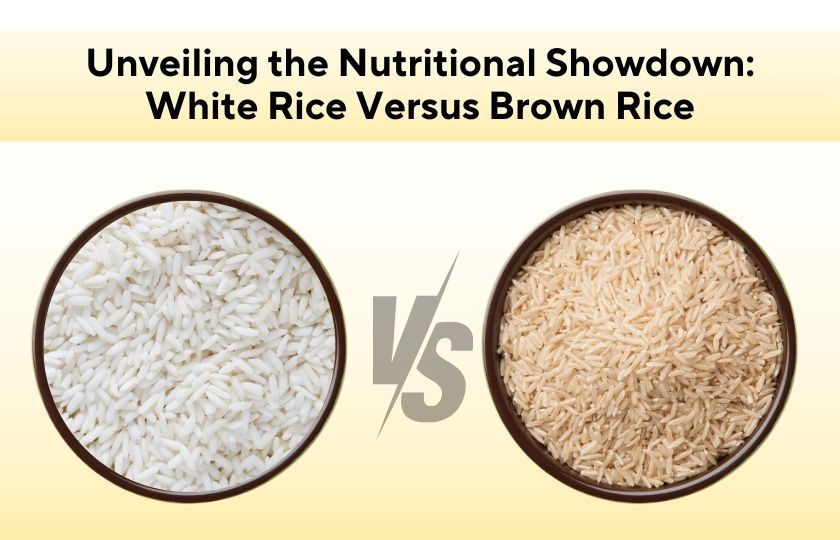
Brown rice is generally more nutritious than white rice. It’s higher in fiber, magnesium, and other nutrients and isn’t artificially enriched with nutrients like white rice.
The white rice versus brown rice debate is a perennial hot topic in the ongoing battle of dietary choices. Advocates on both sides passionately tout the virtues of their preferred grain. But when it comes down to the nitty-gritty of nutritional value, which one emerges as the victor?
Let's delve into the heart of the matter. White rice, beloved in countless households, undergoes a refining process that strips away its outer layers, leaving behind a polished grain. While it boasts a palatable taste, its nutritional profile pales in comparison to its unprocessed counterpart.
During the refining process, white rice loses a significant portion of its B vitamins, including a staggering 90% of B6, along with half the manganese and phosphorus, over half the iron, and all of the dietary fiber and essential fatty acids found in brown rice.
On the flip side, brown rice stands tall as a nutritional powerhouse. Retaining its bran and germ layers, it offers a wealth of nutrients, fiber, and a lower glycemic index compared to its refined counterpart.
Let's explore some of the key health advantages that brown rice brings to the table:
Disease Prevention Arsenal: Brown rice harbors an array of compounds that contribute to disease prevention. Its natural oils work to regulate cholesterol levels and stave off heart diseases. Additionally, nutrients like selenium bolster defenses against diseases such as cancer and arthritis, while antioxidants found abundantly in brown rice boost immunity.
Fiber-Rich Wonder: With 3.5 grams of fiber per cup, brown rice delivers a substantial portion of the USDA's recommended daily intake. Fiber plays a pivotal role in digestive health, combating constipation, promoting regular bowel movements, and purging toxins from the body, thus maintaining bowel health.
Manganese Marvel: Brown rice serves up a hefty dose of manganese, meeting 88% of the recommended daily intake. Manganese plays a crucial role in fortifying the nervous and reproductive systems, while also promoting healthy cholesterol levels.
Glycemic Index Gem: Brown rice earns its stripes as a low glycemic index food, meaning it elicits a slower and steadier rise in blood sugar levels compared to white rice. Studies suggest that regular consumption of brown rice can slash the risk of diabetes by a staggering 60%, making it a prudent choice for diabetics and those aiming to mitigate their risk.
Weight Loss Ally: When it comes to shedding excess pounds, brown rice emerges as a formidable ally. Its high fiber content promotes satiety, keeping hunger pangs at bay and facilitating smaller portion sizes. Additionally, its ease of digestion ensures efficient metabolism, making it a preferred option for weight-conscious individuals.
Despite its nutritional prowess, brown rice may face criticism for its perceived lackluster taste compared to its refined counterpart. However, with the magic of Indian spices, culinary creativity can transform brown rice into delectable dishes like pulao, biryani, or mixed grain dosa and uttapam batter.
Brown Rice vs. White Rice: Nutrient Comparison
Let's dissect the nutrient profiles of these dietary staples to uncover the true victor in the battle of the grains.
White Rice: White rice, a refined grain stripped of its outer layers during processing, boasts a smooth texture and mild flavor that appeals to many palates. However, its nutritional content falls short compared to its unprocessed counterpart.
B Vitamin Depletion: The refining process of white rice results in the loss of significant amounts of B vitamins, including approximately 90% of vitamin B6. This depletion diminishes the grain's potential to support energy metabolism and overall vitality.
Reduced Minerals: Half the manganese and phosphorus content, along with over half the iron, are casualties of white rice refinement. These minerals play essential roles in bone health, energy production, and oxygen transport within the body.
Absence of Fiber: Perhaps the most notable loss during refinement is dietary fiber, which is entirely absent in white rice. Fiber is crucial for digestive health, promoting regular bowel movements, and aiding in weight management by enhancing satiety.
Brown Rice: Brown rice, in contrast, retains its bran and germ layers, resulting in a chewier texture and nuttier flavor. This less-processed form preserves a wealth of nutrients that confer numerous health benefits.
Nutrient-Rich Profile: Brown rice serves as a treasure trove of nutrients, including B vitamins, minerals, and antioxidants. It provides a substantial dose of vitamin B6, manganese, phosphorus, and iron, essential for various bodily functions.
Fiber Champion: With approximately 3.5 grams of fiber per cup, brown rice surpasses white rice in promoting digestive health and satiety. Fiber aids in regulating blood sugar levels, lowering cholesterol, and reducing the risk of chronic diseases like heart disease and diabetes.
Low Glycemic Index: Brown rice boasts a lower glycemic index than white rice, meaning it elicits a slower and steadier increase in blood sugar levels. This quality makes it an ideal choice for individuals seeking to manage blood sugar levels and prevent insulin spikes.
In the showdown between brown rice and white rice, the winner emerges clear: brown rice reigns supreme in terms of nutritional value and health benefits. While white rice may offer convenience and a milder taste, its nutrient depletion pales in comparison to the robust profile of brown rice. By incorporating brown rice into your diet, you can reap the rewards of its fiber, vitamins, minerals, and antioxidants, supporting overall health and well-being. So, when faced with the choice between these two grains, opt for the nutrient-rich powerhouse that is brown rice.
In conclusion, the showdown between white rice and brown rice is decisively won by the latter in terms of nutritional value and health benefits. So, whether you're aiming to bolster your health, manage your weight, or mitigate your risk of chronic diseases, brown rice emerges as the clear winner in this grainy duel. And remember, when cooking brown rice, preserve its nutrients by utilizing soaking water or incorporating flavorful spices to elevate its taste.


Comentarios